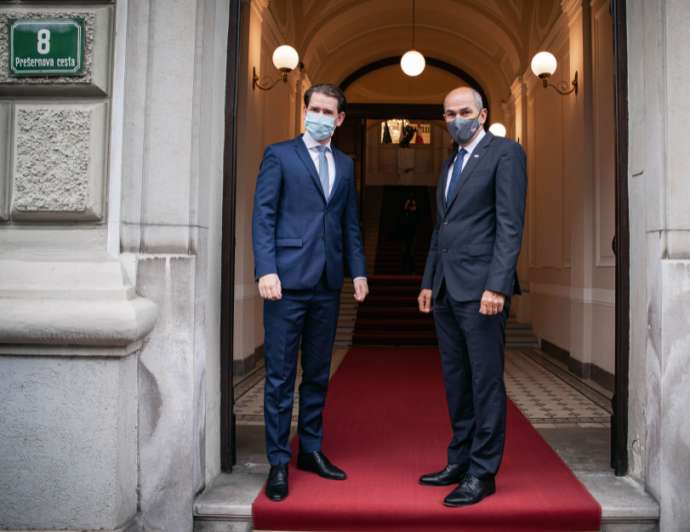STA, 8 September 2020 - Prime Minister Janez Janša and Austrian Chancellor Sebastian Kurz called for a joint approach to the new coronavirus and to illegal migration as they met in Ljubljana this morning.
Janša and Kurz agreed that a full lockdown because of coronavirus should be avoided this autumn, with Kurz stressing that a "light at the end of the tunnel" could already be seen in the fight against the virus.
The chancellor said Austria's goal was to keep schools open, and preserve normal life in all areas as much as possible but with certain rules and adjustments.
Janša warned that the danger of the epidemic was not over yet, as infection numbers were going up throughout Europe. But unlike in the spring, now fewer people develop the disease and die from it, which probably means "we've learned something" and that the protective measures work, he said.
The prime minister noted that Austria and Slovenia had worked closely when the pandemic started, and that Austria had been a kind of a role model for Slovenia in the first, worst weeks of the battle against the virus, being one of the few European countries that were well prepared for the pandemic.
The pair agreed such cooperation would continue.
Obisk v ?? Sloveniji z delovnim zajtrkom z @JJansaSDS pričenja zvezni kancler ?? Republike Avstrije @sebastiankurz. Pogovori o odnosih med državama #koronavirus. pic.twitter.com/4iOisIO9TC
— Vlada Republike Slovenije (@vladaRS) September 8, 2020
Bundeskanzler @sebastiankurz in Slowenien. Treffen mit slowenischem Premier @JJansaSDS. Gespräche über die Beziehungen zwischen den beiden Ländern. ????#coronakrise pic.twitter.com/sACfdBZOYM
— Austrian Embassy SI (@AUSTRIAinSI) September 8, 2020
Turning to illegal migration, Janša stressed that protecting the EU's external borders would be crucial. He called for a strengthening of border protection, a joint EU approach to the issue and assistance to the countries that could be hit the hardest so as to avoid the situation Europe was in in 2015.
He also said countries on the EU's external borders should be assisted. Janša and Kurz agreed that protecting the external borders was essential for removing check points on the EU's internal borders.
The Austrian chancellor, who is on his first visit abroad since the start of the pandemic in February, said "we need a stronger, more competitive Europe in the globalised world". He said today's visit to Slovenia was a sign of a special bond between the two countries.
The pair labelled bilateral relations between Slovenia and Austria as good. Austria is Slovenia's third most important economic partner and the biggest foreign investor.
Janša said the government was preparing measures to make Slovenia even more attractive to foreign investors. Kurz welcomed this, noting that Slovenia was an important economic partner of Austria and that several thousand Austrian companies operated in Slovenia.
The talks also touched on the upcoming 100th anniversary of the Carinthian plebiscite, after which a sizeable part of the Slovenian-speaking territory became Austria after World War I, and the plans for the Slovenian and Austrian presidents to mark the anniversary in Klagenfurt on 10 October together.
This will be the first time that the presidents of both countries will attend the ceremony, so Janša welcomed the initiative. He said several issues regarding the Slovenian minority in Austria remained open but that now they could be tackled easier than in the past.
Kurz also discussed this with President Borut Pahor today, who welcomed the programme of the Austrian government for tackling the issues of minorities and expressed hope that some of the measures discussed would become laws soon. Kurz expressed his genuine readiness for this, according to Pahor's office.
In talks with Janša, Kurz said that his government's programme for the anniversary did not envisage only a financial present for the minority to mark the anniversary but also other measures to support the Slovenian community in the future. He did not specify though when the minority is to receive this present.
Kurz also touched on the efforts to recognise the German-speaking community in Slovenia as a minority in the Constitution, saying Vienna was "grateful" for that.
Janša and Kurz are later scheduled to head to Triglav for a climbing adventure in the north face of Slovenia's highest mountain, with Kurz telling the press he was not worried as the Slovenian prime minister was an experienced climber.






